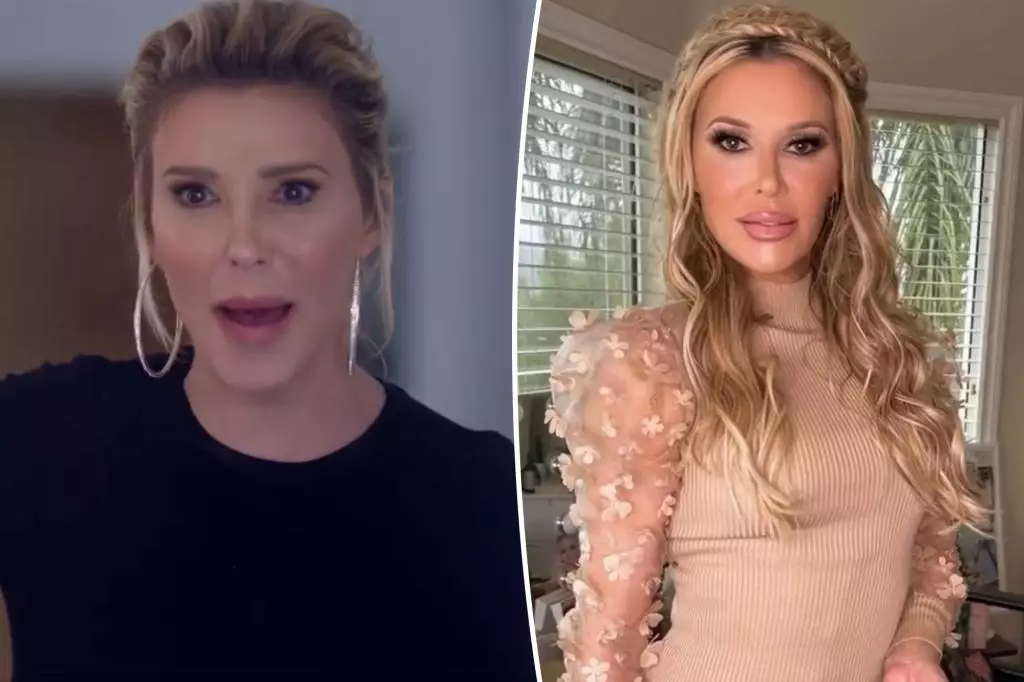In the realm of reality television, controversies often rear their heads with the frequency of weekly episodes. Recently, Brandi Glanville, best known for her tumultuous presence on “The Real Housewives of Beverly Hills,” found herself embroiled in a legal quagmire that has attracted widespread media attention. Following accusations against Andy Cohen, the beloved host of “Watch What Happens Live,” Glanville revealed her legal representatives had severed ties with her, claiming her case against Bravo was weaker than previously asserted. This drastic change of stance raises significant questions about the nature of legal representation in high-profile celebrity disputes.
The allegations against Cohen stem from a video recorded in 2022, where he purportedly made inappropriate comments regarding Glanville. The gravity of Glanville’s claims was heightened when her former lawyers accused Cohen of sexually harassing her, suggesting that his remarks constituted a severe abuse of power. The situation escalates further with Glanville’s now-deleted social media post insinuating that her attorneys may have been “paid off,” implying a deeper conspiracy at play within the industry. This situation illustrates the precarious balancing act that individuals must perform when confronting powerful media figures.
The Nature of Power in Media
At the heart of Glanville’s allegations is a profound commentary on the dynamics of power within the entertainment industry. Cohen’s role as a prominent figure in Bravo’s operations places him in a position of authority, which Glanville argues led to a significant abuse of that power. Her case draws parallels to previous scandals involving powerful men in media, such as the infamous Matt Lauer case, where the prioritization of profits over people created an environment fostering harassment.
Cohen, while admitting the inappropriate nature of his joke, defended it as a mere jest—a point that raises eyebrows regarding the acceptability of humor in situations laden with potential misconduct. His assertion that Glanville was in on the joke suggests a blurry line between comedic banter and offensive behavior, complicating the legal and moral implications of the incident.
In the aftermath of Glanville’s claims, the ripple effects of allegations raised questions not only about her own experiences but also the well-documented challenges faced by women in reality television. Caroline Manzo’s subsequent accusations against Glanville for inappropriate touching without consent only add fuel to the fire, highlighting a disturbing trend of personal grievances becoming public spectacles. While Manzo has chosen to sue Bravo rather than Glanville, this speaks volumes about the risk individuals face when navigating their personal experiences in a very public arena.
Meanwhile, Glanville’s reactions to the turmoil she faces continue to draw attention. She has publicly addressed her deteriorating mental health and the physical manifestations of stress, which she attributes to her tumultuous experiences in the Bravo ecosystem. This candidness, albeit revealing, also sheds light on the broader implications of mental well-being among reality television stars who often grapple with the fallout of their public personas.
As the saga unfolds, one cannot help but wonder how these events will impact Glanville’s future in the reality television landscape. Will she continue to pursue her claims against Cohen and Bravo, or will the weight of the industry bear down on her, leading to a quieter exit? The complexities surrounding these cases invite viewers to grapple with the ethical considerations of their entertainment consumption.
Ultimately, the story of Brandi Glanville and Andy Cohen is not just a headline; it embodies larger issues of power, privilege, and the often-unseen struggles individuals face within the lime-light of their industry. As the wheels of justice turn slowly, the public watches, questioning the very nature of fame and the price one pays for a moment of notoriety in the harsh spotlight of reality television.


Leave a Reply